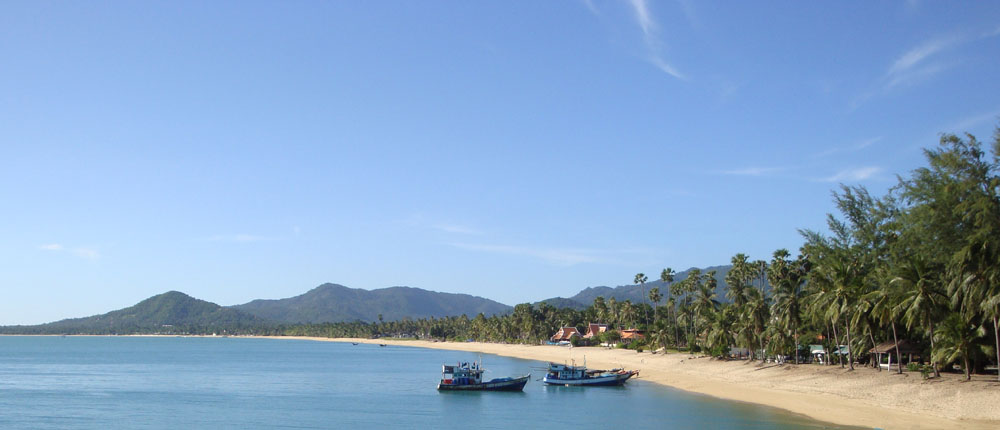-
Posts
12,543 -
Joined
-
Last visited
Content Type
Events
Forums
Downloads
Quizzes
Gallery
Blogs
Everything posted by khunPer
-

is the weather bad right now to come to koh samui?
khunPer replied to parafareno's topic in Koh Samui, Koh Phangan, Koh Tao
Some of us locals use the weather forecast to check what the weather is likely to be in both the very close future and a few days ahead – however, if you ask a local what the weather is like, it can be me telling you that the sun is hing over Maenam Bay from a clear sky, while someone else can tell you that it's pouring down in Lamai; will that be of any help? – an excellent regularly updated weather forecast by the hour is this one HERE. If you wish to know how the downpour situation is right now, then use Surat Thani weather radar, where you for example can se the rainy clouds over Lamai and the clear sky over Maenam... – use the loop option to see how the cluds are moving – link HERE. If you wish a graphic prediction of the future, the this one HERE is excellent, times are UTC/GMT...???? -
I haven't measured it, but enough for the girl's Youtube and Netflix streaming, and my news-reading and little online work. AIS states it's from 2-4 Mbps with 4G, but it really depends on where in the huge World you are connecting to, some places can be slow even with a thick fiber. AIS states up to 2Gbps for their 5G network.
-

Travelling from pattaya to Koh Samui
khunPer replied to parafareno's topic in Koh Samui, Koh Phangan, Koh Tao
The air distance is shorter from Utapao than from Suvarnabhimu... -
I have one as backbone to the fiber, it works fine. The speed is depending on if you have 5G in the area or only 4G. The little AIS router I have, has both WiFi and RJ45 connection... Edit: For the order of good sake I should add that it's not a pocket device, but a desktop thing, Mine is the 4G version that looks like this...
-

Travelling from pattaya to Koh Samui
khunPer replied to parafareno's topic in Koh Samui, Koh Phangan, Koh Tao
Indeed, but I understood the opening question was about air-travel... -

Travelling from pattaya to Koh Samui
khunPer replied to parafareno's topic in Koh Samui, Koh Phangan, Koh Tao
I would take a flight instead, about same price and some 15 hours shorter travelling time... -

Travelling from pattaya to Koh Samui
khunPer replied to parafareno's topic in Koh Samui, Koh Phangan, Koh Tao
Not from Utapao/Pattaya... -

Bruised Young Man Hit With Big Palimony Claim By Married Lover
khunPer replied to webfact's topic in Bangkok News
From the article: "He added that he had already spent hundreds of thousands of baht on her during their relationship"... -
Eastern part of the Maenam Bay, not that many shopping facilities and restaurant as there are in the center part; a fairly quiet area, if that's what you are looking for. If me, I would look for something in the center section of the bay or in the western part. The weather during the 2-3 month monsoon season is very changing, you can have weeks of calm sunny weather, and you can have a couple of weeks with storm, and so heavy rain that many places get flooded, or you can have just gray sky and not too calm sea; during the monsoon season you'll not get bored by reason of the weather, it changes a lot...????
-

Easing of Thai Property Ownership Attracts Wealthy International Buyers
khunPer replied to webfact's topic in Thailand News
But for business you also had some possibilities for land ownership within BOI-rules. -

Easing of Thai Property Ownership Attracts Wealthy International Buyers
khunPer replied to webfact's topic in Thailand News
To my knowledge an investor visa has been available for quite some time, where investing 40 million baht gave access to foreign ownership of 1 rai of land – how many have actually used that possibility over the years...???? -

Flying to Samui with Bangkok Air
khunPer replied to parafareno's topic in Koh Samui, Koh Phangan, Koh Tao
Agree, I'm also former airline worker, i.e. educated in planning & navigation and C/D theory... -

Box jellyfish attack in Haadrin this afternoon
khunPer replied to delgarcon's topic in Koh Samui, Koh Phangan, Koh Tao
We have a previous thread about Box Jelly Fish here... -

Does it gets boring in Koh Phangan, Samui?
khunPer replied to parafareno's topic in Koh Samui, Koh Phangan, Koh Tao
There are many, but I'm not a booking agency, so I don't drive around the island to look for signs and telephone numbers. In Maenam there are Tripple S (Google Street View-link HERE) and Madam P (next door with the ATM machine in front), the latter I think is called Maenam Bungalows, but I don't have their phone number, just sawadee the owners several times a week, when I pass. Both are about 100 meters from an Asian Top 10-beach. Then there is this one, some 300-400 meters from the beach (GSV HERE), and in Bo Phut I know this one "Meesang Garden Resort" (GSV HERE). You can actually use GSV to get around, check area and find something of interest, but mind you that the GSV-images might be 5-6 years old...???? -
Apart from the calendar, the weather furthermore sticks to El Nino and La Nina. The latter this year, which means more rain – some says 5 percent more downpour – it has been quite some, especially in the first half of 2022.
-

Does it gets boring in Koh Phangan, Samui?
khunPer replied to parafareno's topic in Koh Samui, Koh Phangan, Koh Tao
I've been staying both places, but mainly Maenam. Lamai beach village or area is cozy, have more restaurants and life on the beach area and more nightlife in form of beer bars (with ladies) and a square with a Thai boxing arena in action on Saturdays (I don't know if it's reopened by now after Covid lockdown); it's merely like you expect Thailand. I however don't fancy the beach as much as Maenam, more waves and miss the view to neighboring islands. Maenam beach is quite long – about 5 kilometers – and little different, depending of where you stay on that stretch; however, beach and view almost the same. In both ends of Maenam there are some few beer bars by the ring road, while in the middle section there are no nightlife like that, but cozy pubs and restaurants. Maenam is more laid down than Lamai. Personally I prefer to live in Maenam, while lamai has been great for shorter stays and bit of partying; especially earlier, when they had some late clubs – that part of the nightlife has unfortunately ceased to exist. -

Does it gets boring in Koh Phangan, Samui?
khunPer replied to parafareno's topic in Koh Samui, Koh Phangan, Koh Tao
You don't find the good bargains for longer term rent of bungalows by calling hotels. Your best bet is to book something for the first few night and then find it locally, either by simply asking – it use to work quite well – or rent some kind of transportation and get around the island, and look for "For Rent"-signs. You can find Okay bungalows fan-only from about 8,000 baht a month and with aircon in the area from 10,000 baht a month, even within walking distance from beach, restaurants and shopping...???? -

Does it gets boring in Koh Phangan, Samui?
khunPer replied to parafareno's topic in Koh Samui, Koh Phangan, Koh Tao
I never go to fitness, and don't go much to restaurant, but takes a walk on the beach daily. I'm never bored on Samui, so much else to do and enjoy, including the party life that presumably is quite different from Pattaya, at least from what I have experienced up there. Probably, as well as everywhere in Thailand, depending whom you mingle with and how you behave – there plenty of single females visting the island – if you specific are considering a Thai girlfriend, some level of providing might also be a benefit, if not a must. And for "etc.....", yes there are also numerous rainbow-options available...???? -
I don't understand this line from the article – it's the "40-watt" – a typo or can some give me an explanation... According to Nissan Motor Thailand, 40-watt EV battery can supply enough power for a small family to use for 3-4 days.
-
Seems like the Russians are not aware of that the tourists season on Samui ends today, from tomorrow it's monsoon season until just before Xmas (Western Xmas)...
-
At least one pair is neighbors on Samui – so far no war – I think both of them have more problems with the local authorities than with each other...




